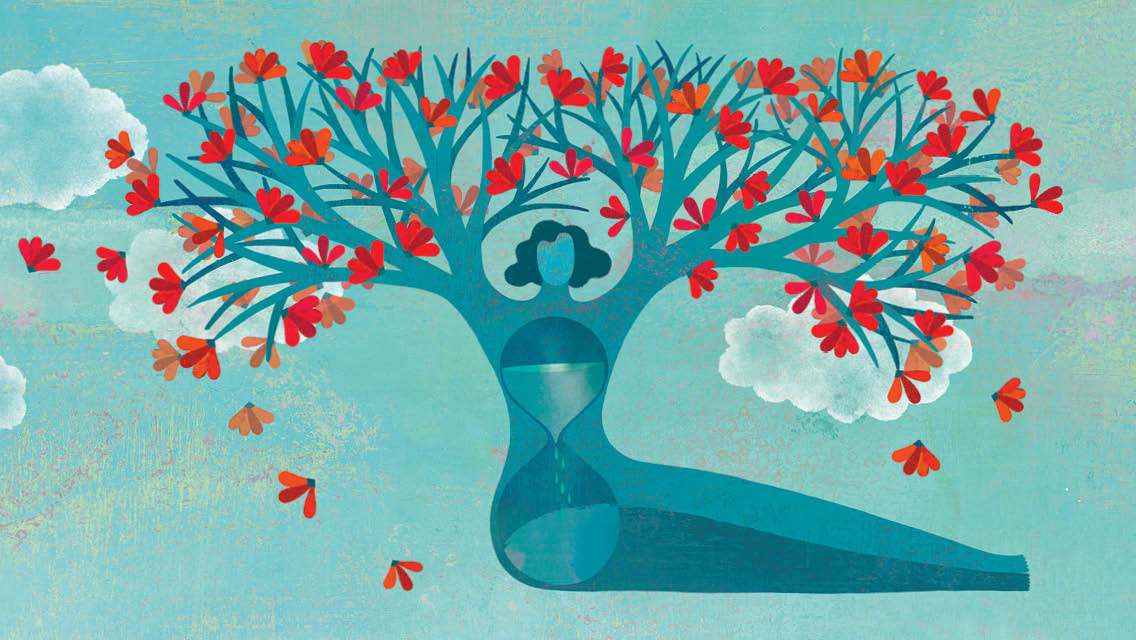Hot flashes, mood swings, night sweats, and weight gain: these are some of the assumed, unavoidable, and dreaded hallmarks of the menopausal years. And ready for them or not, menopause does happen to every woman eventually.
Leading up to it, there’s a transition period called perimenopause. The ovaries begin releasing fewer eggs and estrogen starts to decline, and as a result, the monthly cycle may be irregular and unwanted symptoms can start to appear. This shift from fertility and regular menstruation to a state of infertility and absence of a period for one year or more is what officially defines “menopause.”
While, yes, this life stage does mark a significant and irreversible shift in physiology, there are some prevalent menopause myths to dispel — and not every symptom and assumption has to be a given.
Myth No. 1: Hot flashes and night sweats are normal.
It’s estimated that two out of every three women in perimenopause struggle with hot flashes and night sweats. But common and normal are two very different things.
This flushing and discomfort is not necessarily optimal. The degree and severity varies from person to person, and it’s thought that these frustrating symptoms are tied to declining estrogen levels. It can be helpful to focus on strategies to support a more graceful hormonal decline by avoiding known triggers.
Some common causes for hot flashes and night sweats may include poor circulation patterns, stress, smoking, alcohol and caffeine intake, and excess heat. I always encourage clients to address each of these factors, including prioritizing their exercise routine to support cardiovascular health and circulation, as well as regular and purposeful stress management.
Myth No. 2: I won’t have any hormones left.
As the ovaries start to slow down hormone production needed for fertility, a decline in reproductive hormones such as estrogen, progesterone, and testosterone occurs. However, it’s not as if a woman who has gone through menopause doesn’t have any of these hormones left.
Post-menopause, hormone production is taken over by the adrenal glands (which also govern the body’s stress response), and there are still target ranges of optimal hormone levels for a woman to feel and function her best.
Even though the ability to reproduce is gone, these reproductive hormones still have important functions for the post-menopausal phase of life, including impact on energy levels, cognition, body composition, and bone health.
I believe everyone deserves to feel their best, and therefore always encourage comprehensive blood testing (reproductive hormones included) annually to try to optimize levels in a way that is relevant to each individual’s life stage.
Myth No. 3: I’m going to gain weight no matter what.
Trouble with body composition during perimenopause is not a given, although it is a common frustration.
Weight changes are more than likely related to hormone imbalances during this shift, which again highlights the importance of regular testing. It can be tempting to overly-restrict calories and exercise for longer or more intense durations in an effort to shed fat, but that might be unnecessary at best and harmful at worst. These intense strategies can create more stress on your body and challenge your adrenal glands, both of which can further worsen the root issue.
Focus instead on gentle strategies to balance your hormones.
Myth No. 4: I need to start taking calcium.
The importance of bone health is underscored during this life stage — and for good reason. Declining hormone levels may make you more susceptible to weak bones and fractures.
While being mindful of calcium intake isn’t bad, focusing only on that mineral for bone health is a bit misguided. In fact, most people do not want to be taking calcium alone and in isolation from other nutrients, as it may contribute to cardiovascular problems.
Healthy bones rely not only on calcium, but also on magnesium, vitamin D, and vitamin K — nutrients that all work together to support your structural system. When working with my clients and their healthcare teams, we usually end up tweaking their supplement regimen to provide a well-absorbed combination of calcium and magnesium from di-calcium malate and di-magnesium malate, along with a vitamin D3 and vitamin K2 combination as well.
Pairing strategic supplementation with regular strength training and weight lifting is also key to provide the best support to healthy bone integrity.
Myth No. 5: I’m not going to feel like myself anymore.
Since many women experience mood swings, changes in body composition, and an extended time in perimenopause, frustration can build from not feeling quite like yourself anymore.
Menopause is undoubtedly a major life shift, but it’s also an awesome time to fall in love with your body and all of its capabilities again.
Life transitions are like built-in “pause” buttons: My clients have often seen success by turning inward to appreciate all of the ways that their body serves them and by shifting their health goals to building strength and managing stress.
This mindset can not only make the changes in this phase of life feel more manageable, but it can also play a role in altering the underlying physiological changes that are happening.
Common depictions about menopause are often clouded by misconceptions and myths, but with the right approach, strategies, and mindset, navigating this shift gracefully can be within reach.




